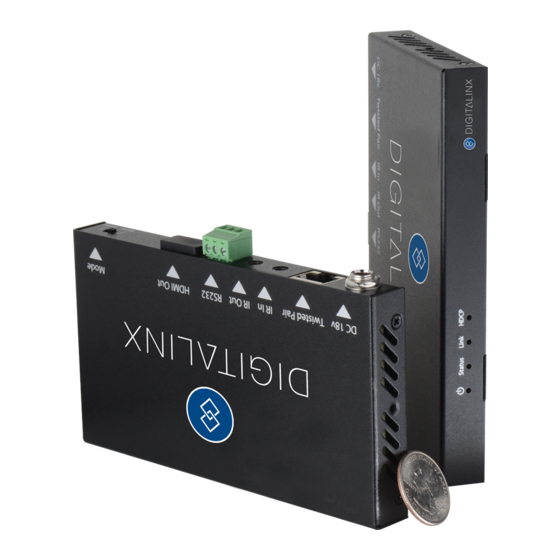DigitaLinx DL-HD70 Manuel d'installation - Page 2
Parcourez en ligne ou téléchargez le pdf Manuel d'installation pour {nom_de_la_catégorie} DigitaLinx DL-HD70. DigitaLinx DL-HD70 2 pages.
Également pour DigitaLinx DL-HD70 : Manuel d'installation rapide (8 pages)

The DigitaLinx DL-HD70 HDBaseT extender set transmits HDMI, bidirectional IR, and
RS232 up to 70 meters away using a single Category 6 twisted pair cable.
Built-in surge protection and diagnostic LEDs ensure hassle-free and robust installations.
Flexible power design allows the units to be powered at either the TX or RX end, and
only one power supply is required. The 12 volt power supply is secured with a screw-on
connector to prevent the power from being accidentally disconnected.
The DL-HD70 is sold only as a set. The individual transmitter and receiver are not
compatible with other HDBaseT devices due to proprietary PoE circuitry.
1
8
TIA/EIA-568B
Pin 1
Orange/White
Pin 2
Orange
Pin 3
Green/White
Pin 4
Blue
Pin 5
Blue/White
Pin 6
Green
Pin 7
Brown/White
Pin 8
Brown
RS232 Wiring
Connect the controller or device RXD signal
to Tx on the DL-HD70 extender. Connect the
controller or device TXD signal to Rx on the
DL-HD70 extender.
Diagnostic LEDs:
The DL-HD70 provides four blue LEDs to indicate the current operating status and to assist
troubleshooting an installation.
Power: Solid, the DL-HD70 extender is receiving power from the power supply or from the
remote extender via Category 6 cabling.
Status: Flashes once per second, the HDBaseT processor is running.
Link: Solid, the two DL-HD70 extenders are communicating via Category 6 cabling.
HDCP: Solid, HDCP signal is present in the HDMI stream. Flashes quickly, no HDCP signal is
present in the HDMI stream.
Mode Switch:
The mode switch is used when updating fi rmware in the extender. A separate document will
provide usage instructions once a new fi rmware update is available.
Twisted Pair Wiring
Use TIA/EIA-568B wiring for Category 6
connection between send and receive units.
DL-HD70-TX or
Controller or
DL-HD70-RX
Device
Tx
RXD
Rx
TXD
GND
Instructions
1. Verify all components included with the extender set are present
before installation.
2. If the extenders are going to be permanently mounted to a surface,
attach the included mounting brackets with the supplied screws.
3. Turn off power and disconnect the audio/video equipment by
following the manufacturer's instructions.
4. Connect Category 6 or greater twisted pair cable with RJ45 connectors
between the transmitter (DL-HD70-TX) and the receiver (DL-HD70-RX).
TIA/EIA-568B straight-through wiring connections must be used with all
HDBaseT extenders.
5. Connect an HDMI cable and any desired control accessories between
the display and the receiver (DIGI-HD70-RX).
6. Connect an HDMI cable and any desired control accessories between
the source and the transmitter (DIGI-HD70-TX).
7. Connect the included power supply to the transmitter or receiver and
lock the power supply to the power connector by twisting the locking
collar counter clockwise.
8. Power on attached audio/video devices.
Passing IR Signals:
The DL-HD70 is capable of passing IR signals between 33 and 55 KHz. To prevent damage to
any of the electronics, the extenders should be powered off while inserting or removing any IR
components. Inserting an IR transmitter into the IR IN port may damage the IR circuit for that
extender.
IR OUT: The IR transmitter (IR emitter) must be plugged into the IR OUT port.
IR IN: The IR receiver (IR eye) must be plugged into the IR IN port.
Important notice:
•
Do not attempt to disassemble or alter the extender housing. There are no user-
serviceable parts inside the unit. Doing so will void your warranty.
•
To minimize the possibility of equipment damage from electrostatic discharge
(ESD), all source and destination equipment must be powered off during installation.
•
Do not connect the extender to a telecommunication outlet wired to unrelated
equipment. Doing so may damage the unit or any connected equipment. Ensure all
connected twisted pair cabling is straight-through (point-to-point).
•
Allow proper ventilation to reduce the risk of thermal failure.
